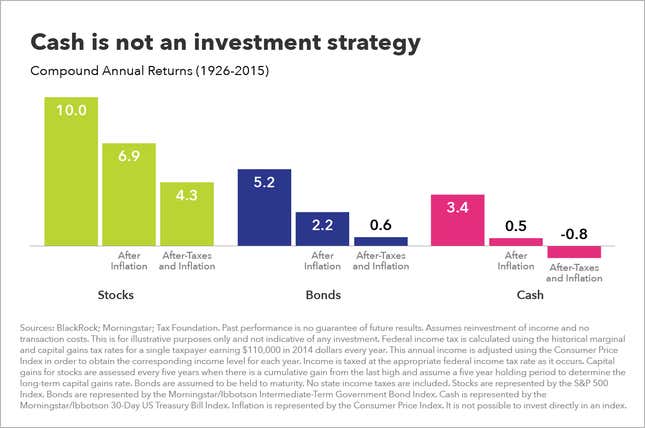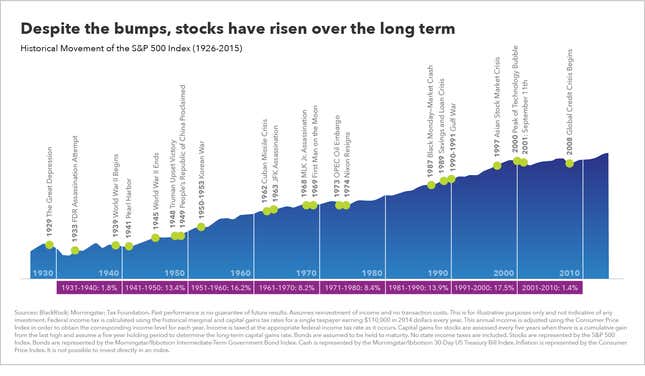The savings account has been a building block of our lending system since the Great Depression reforms of the 1930s. The Banking Act of 1933 federally guaranteed cash deposits and made them easily accessible.
But while we know savings can be a safe, convenient option for cash needed to meet expenses, storing money is not the same thing as storing value. By simply holding cash we ignore the opportunity for potential gains that can come from a thoughtful, dedicated investment strategy. If what we really seek is financial safety — the likelihood of having the money we need, when we need it — we will have to move from being savers to investors.
The cost of being cautious
The term “savings account” is sort of a misnomer. After inflation and taxes the money we deposit into savings will almost surely lose value, especially given the ultra low interest rate environment of the last few years. Over the long term, cash has averaged an annual tax- and inflation-adjusted return of -0.8%, while stocks have enjoyed an average annual return of 4.3%.

Yet, Americans hold an average of 65% of their wealth in cash, according to a BlackRock study. Perhaps surprisingly, Baby Boomers are actually more diversified than most, with 60% of their assets in cash. Gen-X and Millennial investors are far more conservative, holding cash at rates of 68% and 70% respectively.
Investment theory tells us this is exactly backwards—younger people should take on more risk to grow their long-term portfolios, as they have more time to recoup market losses and can also take advantage of the positive effects of compounding.
The difference in behavior may speak to how historical events and our experiences divide us as investors. For those who came of age during the global financial crisis of 2009, or the ensuing years of market volatility and legislative gridlock, there’s less confidence that a government-funded safety net will still be available to draw on during retirement. According to a survey conducted by the Transamerica Center for Retirement Studies, only 17% of Millennials expect Social Security to be a primary source of income, compared to 34% of Boomers. That could explain the emphasis on saving: 55% of Millennials expect to rely on self-funded savings, while only 39% of Boomers expect to.
Dipping a toe in the water
Regardless of age, an innate human behavioral bias could also explain the preference for saving over investing. For many, the fear of losing money is stronger than the desire to grow it. As a result, loss-averse savers can end up making irrational long-term investment choices.
This needn’t be the case. Of course understanding risk is important. But by lengthening our investment time horizon, we can clearly see that stock markets have overcome even the biggest waves of volatility—including the most recent financial crisis.

So how can you make the transition from saver to investor? The BlackRock study shows that successful, or wealthier, investors tend to rely on professional advice, whether online or from a human. Guidance may not only improve an investment portfolio’s prospects, but also minimize counterproductive behaviors that work against our long-term financial health. Simple steps like these may help people, no matter where they are on their investing journey, build a sturdy base of wealth for tomorrow.
One way to get started is with an ETF like the iShares Core S&P 500 ETF (IVV), which provides broad exposure to large U.S. stocks at extremely low cost and with tax efficiency.
This article was produced by Quartz creative services and not by the Quartz editorial staff.
Visit www.iShares.com or www.BlackRock.com to view a prospectus, which includes investment objectives, risks, fees, expenses and other information that you should read and consider carefully before investing.
Diversification and asset allocation may not protect against market risk or loss of principal.
BlackRock does not provide tax advice. Investors should speak to their tax professional for specific information regarding their tax situation.
This material is provided for educational purposes only and is not intended to constitute investment advice or an investment recommendation within the meaning of federal, state or local law. You are solely responsible for evaluating and acting upon the education and information contained in this material. BlackRock will not be liable for direct or incidental loss resulting from applying any of the information obtained from these materials or from any other source mentioned. BlackRock does not render any legal, tax or accounting advice and the education and information contained in this material should not be construed as such. Please consult with a qualified professional for these types of advice. Transactions in shares of ETFs will result in brokerage commissions and will generate tax consequences.
The iShares Funds are distributed by BlackRock Investments, LLC (together with its affiliates, “BlackRock”).
©2016 BlackRock. All rights reserved. iSHARES and BLACKROCK are registered trademarks of BlackRock. All other marks are the property of their respective owners. iS-19456-1016
